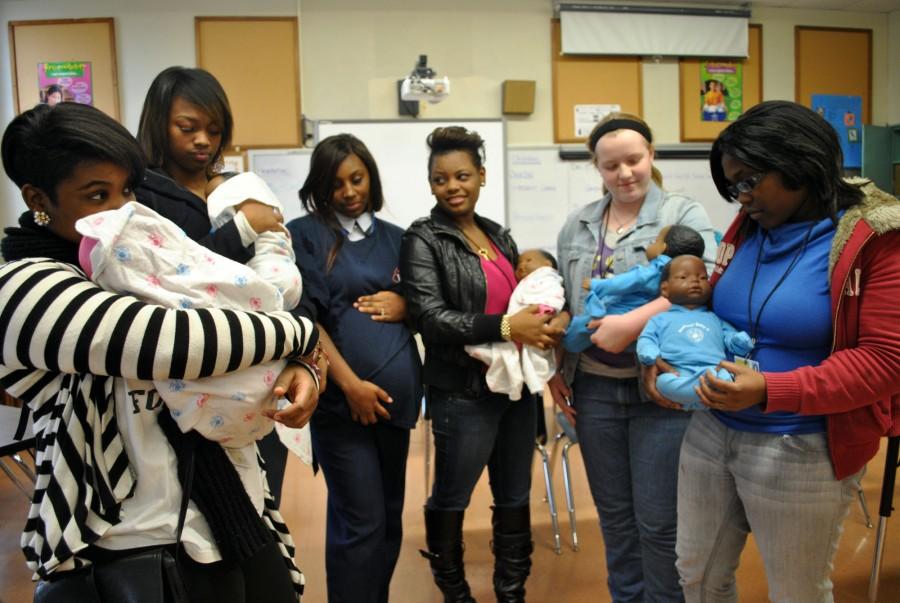“I have been working at U. City High for ten years and have seen an increase of pregnant students over the years,” said interim principal Dayle Burgdorf.
Although parental consent is a large problem when determining what should or should not be taught in a class, schools are an information center where students are expected to receive useful knowledge that will help them throughout their lives, on a wide range of topics, including sexual education.
“One of the biggest barriers is parental involvement,” said Patricia Wilson, nurse. “If the parents say no, then it will not happen.”
Adding to the problem is the fact that many students do not feel comfortable speaking to their parents about sex or asking any questions regarding this subject, and parents usually feel the same way.
“I will ask students many times if they’re comfortable talking with their parents and they say ‘no,’” said Wilson.
Avoiding this taboo subject, however, often leads teenagers to have erroneous information regarding sex.
“There were girls in my health class in tenth grade who thought they could prevent pregnancy after unprotected sex by showering,” said senior Luke Babich.
Kurt Tuegel, who has been a teacher at U. City for twelve years and recently began teaching health, said, “There’s nothing in here [the health class curriculum] about sex education.”
Because it is not part of the curriculum, sex education is not really covered in U. City’s health class.
“They tell us to use condoms, but then they don’t teach us how to use them,” said senior Dominique Patrick.
The curriculum at U. City has not been changed in the past six years even though it is lacking in information regarding sex education and a number of students get pregnant at U. City High every year. “We have had freshmen girls come in here and they’ve already had a child,” said Tuegel.
Esther Wilkinson, who teaches Child Development, said she usually has one or two girls who are pregnant or have already had a child in her class. Some of these students struggle to come to school and finish their education.
Wilson does not believe students at U. City have an adequate understanding of sex.
“They need to have a better program in place for them,” said Wilson. “I think students in high school know the consequences [regarding sex], but don’t understand them.”
Wilson said that when students tell her they are pregnant, she doesn’t give them any options.
“They have to make that decision themselves. That’s why I refer them to places like Planned Parenthood or the County Health Department,” said Wilson. “Most students decide to keep the baby anyway.”
One such instance of this is senior Jamecah Murphy, who has decided to keep her child. Last year there were 16 prenant teenagers in U. City, according to district records. In recent years, the numbers have basically flatlined.
“Being a pregnant teenager was never how I pictured myself being at this age,” said Murphy. “But I’m going to live with my decisions and try and make the best of it.”
Murphy and her boyfriend, senior Markus Jones, have been together for five years and are very committed to being the best parents they can be.
“I don’t want people to feel bad for us or look down on us for making a mistake because we are prepared for the challenges that we will have to overcome,” said Jones.
Wilson tells students who are pregnant that they will need additional support besides their girlfriends.
“I think they [students] feel comfortable talking with us [school nurses]. I try not to steer them in the wrong direction,” said Wilson.
The school’s nurse gives students a confidential place to speak about their concerns with their body, but the school has no actual class where students can learn about sexuality.
Perhaps it is time that the problem of unwanted pregnancies and sexually transmitted diseases is addressed. Although the ABC (Abstinence by Choice)program, which promotes abstinence, has been in place in U. City for a number of years, there is no program that teaches students about how to have a healthy sexual life or about the physical and emotional implications of having sex. The ABC program’s funding from the government was also cut, which has not helped to improve this program.
“They need to cover more,” said Wilson. “They really don’t even talk about sexual choices. Now the real question is–it’s not what we want; it’s what the community wants–are they truly willing to support this?”
Wilkinson agreed and said, “They [the school district] should look at birth control and dangers of unproteced sex.”


























